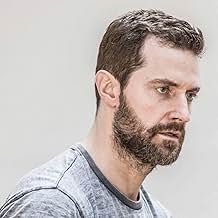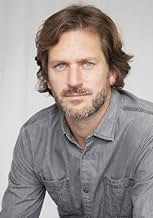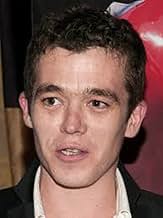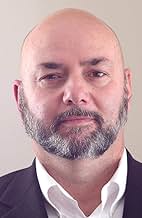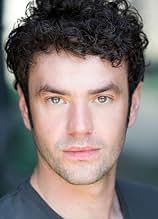ÉVALUATION IMDb
5,9/10
6,9 k
MA NOTE
Dans l'Irlande du XIIIᵉ siècle, un groupe de moines doit escorter une relique sacrée à travers un paysage semé d'embûches.Dans l'Irlande du XIIIᵉ siècle, un groupe de moines doit escorter une relique sacrée à travers un paysage semé d'embûches.Dans l'Irlande du XIIIᵉ siècle, un groupe de moines doit escorter une relique sacrée à travers un paysage semé d'embûches.
- Prix
- 1 victoire et 3 nominations au total
Akilas Karazisis
- The Killer
- (as Akillas Karazisis)
Gaëtan Wenders
- Fournier
- (as Gaetan Wenders)
Avis en vedette
A very classic "we have to go from A to B and it is dangerous". I really loved the way the film improved because I knew a little bit about Irish history. (Check out Wikipedia for Irish history for 5 min before viewing the film.) It gave me the 13th century feel. Not excellent, but very good.
Yes this film is bloody. For some the scenes might even be shocking, but I really enjoyed this film. Acting was good, the suspense build up was very good. And at no point did it seem the violence was unnecessary. If you enjoy historical type films and don't mind seeing a head bashed in close up, you will enjoy this.
PILGRIMAGE (2017)
This is the new film from the Irish director of the excellent 2009 flick called SAVAGE about an assault on a news reporter in Dublin (and it's aftermath) and I gotta say, if Werner Herzog had made this film rather than one about an Amazonian trek he wudda been quite happy.
The film is set in the early 1200s in Ireland where superstition and the struggle for Christian domination of the country are rife and there, an envoy from Rome is sent to collect a supposedly sacred relic from some rural monks and bring it back to the holy city.
The movie is grim, and conveys the horrible conditions people existed/lived in back then perfectly (the bloody weather looks the same as Ireland has now though haha). It's highly atmospheric, with bleak Irish landscapes, and the acting is top notch with the film basically being a dangerous road trip carrying the relic to a ship that's waiting for them in Waterford (to sail across to France and onward to Rome).
The fact that the film is recorded in Irish, French, and English adds a brilliant realism to proceedings which echoes the situation at the time with Ireland being infringed upon from all sides, and along the way things get very messy and bloody (one death is particularly gruesome).
I'm sure there wasn't a huge Hollywood budget for PILGRIMAGE but they've kept things really concentrated and its certainly exceeds what you might expect to be straight to video cheese.
This is the third film I've seen by Brendan Muldowney and I think the guy has some talent. I will be looking out for his next film and if you haven't already caught SAVAGE Id check that out too.
This is the new film from the Irish director of the excellent 2009 flick called SAVAGE about an assault on a news reporter in Dublin (and it's aftermath) and I gotta say, if Werner Herzog had made this film rather than one about an Amazonian trek he wudda been quite happy.
The film is set in the early 1200s in Ireland where superstition and the struggle for Christian domination of the country are rife and there, an envoy from Rome is sent to collect a supposedly sacred relic from some rural monks and bring it back to the holy city.
The movie is grim, and conveys the horrible conditions people existed/lived in back then perfectly (the bloody weather looks the same as Ireland has now though haha). It's highly atmospheric, with bleak Irish landscapes, and the acting is top notch with the film basically being a dangerous road trip carrying the relic to a ship that's waiting for them in Waterford (to sail across to France and onward to Rome).
The fact that the film is recorded in Irish, French, and English adds a brilliant realism to proceedings which echoes the situation at the time with Ireland being infringed upon from all sides, and along the way things get very messy and bloody (one death is particularly gruesome).
I'm sure there wasn't a huge Hollywood budget for PILGRIMAGE but they've kept things really concentrated and its certainly exceeds what you might expect to be straight to video cheese.
This is the third film I've seen by Brendan Muldowney and I think the guy has some talent. I will be looking out for his next film and if you haven't already caught SAVAGE Id check that out too.
This strong, atmospheric, and beautifully-made little film did not disappoint based on reviews that either put it in the trash for "gratuitous violence" or gave it a firm pat on the head for a good attempt.
I see the value in the latter assessment - working on a budget, this film does a lot with what it has, providing hauntingly beautiful vistas of an ancient Ireland and making its story stretch beyond its small shooting framework. The actors, too, make so much of the script they've been given, with great performances throughout. Although this does lead me onto the main drawback of the film: the characters are largely undeveloped, especially that of Diarmuid - who is the protagonist no less - and his Brothers. We can see that he cares about them a lot - after all, "the monastery is all he's ever known" - but more development would have been crucial to making me really care about whether they lived or died, failed or succeeded. The most interesting characters for me were Geraldus and the Mute, "grey" characters whose backstories are hinted at if never fully disclosed, and with sublime subtlety in the case of Bernthal's character. The characters we do get to truly see are rewarding, albeit darkly, and were one of the film's greatest triumphs - it just would have been great to see the same treatment given to the lead protagonist and primary villain.
In the other camp, I don't think the story could have worked without the levels of violence, savagery, and loss that we see, which the viewer must witness with the same unblinking acceptance that the characters do. In this, there is a hidden depth to Pilgrimage, a story about Ireland, the land where "there was never peace". One review focused around the particular Irishness of the film rang true in some places - that the colour shown here is multiple shades of grey, and little green - if not in others. This is not a deconstruction of the "Irish" mythos, but it does touch, tenderly and reverentially, upon the idea of an unattainable relic: to know peace, both within and without, a dream not limited to this country but echoed in Jerusalem and beyond. Though it does not present its findings in a wholly satisfying parcel, the film did provoke thought about where that quest for peace could lead us next - to what bloody ends or watery graves? To what loss and to what triumphs?
"Where to now?"
I see the value in the latter assessment - working on a budget, this film does a lot with what it has, providing hauntingly beautiful vistas of an ancient Ireland and making its story stretch beyond its small shooting framework. The actors, too, make so much of the script they've been given, with great performances throughout. Although this does lead me onto the main drawback of the film: the characters are largely undeveloped, especially that of Diarmuid - who is the protagonist no less - and his Brothers. We can see that he cares about them a lot - after all, "the monastery is all he's ever known" - but more development would have been crucial to making me really care about whether they lived or died, failed or succeeded. The most interesting characters for me were Geraldus and the Mute, "grey" characters whose backstories are hinted at if never fully disclosed, and with sublime subtlety in the case of Bernthal's character. The characters we do get to truly see are rewarding, albeit darkly, and were one of the film's greatest triumphs - it just would have been great to see the same treatment given to the lead protagonist and primary villain.
In the other camp, I don't think the story could have worked without the levels of violence, savagery, and loss that we see, which the viewer must witness with the same unblinking acceptance that the characters do. In this, there is a hidden depth to Pilgrimage, a story about Ireland, the land where "there was never peace". One review focused around the particular Irishness of the film rang true in some places - that the colour shown here is multiple shades of grey, and little green - if not in others. This is not a deconstruction of the "Irish" mythos, but it does touch, tenderly and reverentially, upon the idea of an unattainable relic: to know peace, both within and without, a dream not limited to this country but echoed in Jerusalem and beyond. Though it does not present its findings in a wholly satisfying parcel, the film did provoke thought about where that quest for peace could lead us next - to what bloody ends or watery graves? To what loss and to what triumphs?
"Where to now?"
Out of the creeping faerie mist of a dark age comes an intensely suspenseful tale about why we choose our allegiances. This is the heart of the story - our reasons make no sense.
The drama revolves around a lump of rock. That any other lump could replace it at any time and no-one would notice is openly stated in the dialogue. It's the stark question woven through the plot - is faith taken on faith alone really worth fighting for?
It's a tense film, beautifully written and exquisitely acted. Each viewer decides what the film's about - it doesn't explain itself, it falls silent. Everyone will see something different. Some might conclude we're all compelled towards war whether we like it or not. Some might decide we're all in league with the Devil whether we know it or not. Some might believe we're all still lost in the creeping faerie mist clutching for something to save us.
Some reviewers didn't rate it highly as an action thriller but it's not a superficial movie and maybe doesn't fit into that genre. There's far more being shown in the subtext and the themes than being told in the action. As for the excessive violence, I felt it merely conveyed the grim reality of melee combat. After all, hidden in the word 'Pilgrimage' is the word 'grim'.
It's a mark of a brilliant film when after seeing it once you must see it again. On the second viewing, it bit me deeper on the neck and made me more its thrall.
For me, the main highlight was Jon Bernthal's acting. It was haunting. He played a voiceless man who served the monks as the lowliest of their group and I fell in love with his tragic integrity. He reminded me of another tormented anti-hero of contemporary myth - Angel from 'Buffy The Vampire Slayer': the vampire cursed with a soul, plagued by a weight of remorse for a hellish past. Both crave absolution and will do anything to receive it.
I loved 'Pilgrimage'. It was a strangely beguiling hybrid of superstitious medievalism clashing with an ancient landscape alive with pre-existing belief. And the ending was satisfyingly unsatisfying - like all good fairy tales are.
The drama revolves around a lump of rock. That any other lump could replace it at any time and no-one would notice is openly stated in the dialogue. It's the stark question woven through the plot - is faith taken on faith alone really worth fighting for?
It's a tense film, beautifully written and exquisitely acted. Each viewer decides what the film's about - it doesn't explain itself, it falls silent. Everyone will see something different. Some might conclude we're all compelled towards war whether we like it or not. Some might decide we're all in league with the Devil whether we know it or not. Some might believe we're all still lost in the creeping faerie mist clutching for something to save us.
Some reviewers didn't rate it highly as an action thriller but it's not a superficial movie and maybe doesn't fit into that genre. There's far more being shown in the subtext and the themes than being told in the action. As for the excessive violence, I felt it merely conveyed the grim reality of melee combat. After all, hidden in the word 'Pilgrimage' is the word 'grim'.
It's a mark of a brilliant film when after seeing it once you must see it again. On the second viewing, it bit me deeper on the neck and made me more its thrall.
For me, the main highlight was Jon Bernthal's acting. It was haunting. He played a voiceless man who served the monks as the lowliest of their group and I fell in love with his tragic integrity. He reminded me of another tormented anti-hero of contemporary myth - Angel from 'Buffy The Vampire Slayer': the vampire cursed with a soul, plagued by a weight of remorse for a hellish past. Both crave absolution and will do anything to receive it.
I loved 'Pilgrimage'. It was a strangely beguiling hybrid of superstitious medievalism clashing with an ancient landscape alive with pre-existing belief. And the ending was satisfyingly unsatisfying - like all good fairy tales are.
Le saviez-vous
- AnecdotesTo prepare for his role, Jon Bernthal spent the first few weeks of shooting completely silent, even when he's not on set.
- GaffesToutes les informations contiennent des divulgâcheurs
Meilleurs choix
Connectez-vous pour évaluer et surveiller les recommandations personnalisées
- How long is Pilgrimage?Propulsé par Alexa
Détails
- Date de sortie
- Pays d’origine
- Langues
- Aussi connu sous le nom de
- El sacrilegio
- Lieux de tournage
- sociétés de production
- Consultez plus de crédits d'entreprise sur IMDbPro
Box-office
- Budget
- 4 749 500 € (estimation)
- Brut – à l'échelle mondiale
- 23 689 $ US
- Durée1 heure 36 minutes
- Couleur
- Mixage
- Rapport de forme
- 2.35 : 1
Contribuer à cette page
Suggérer une modification ou ajouter du contenu manquant




